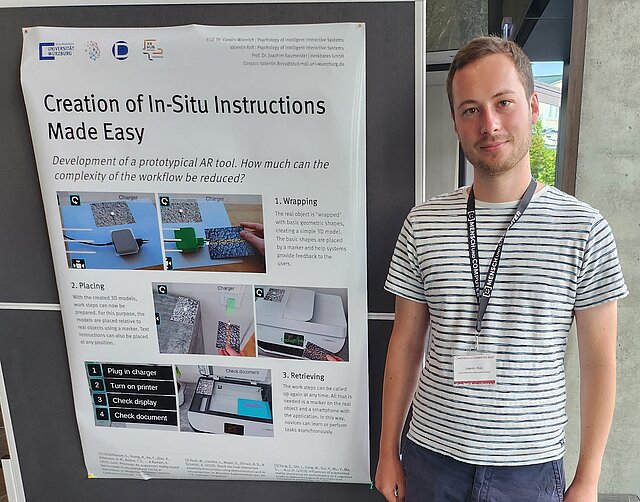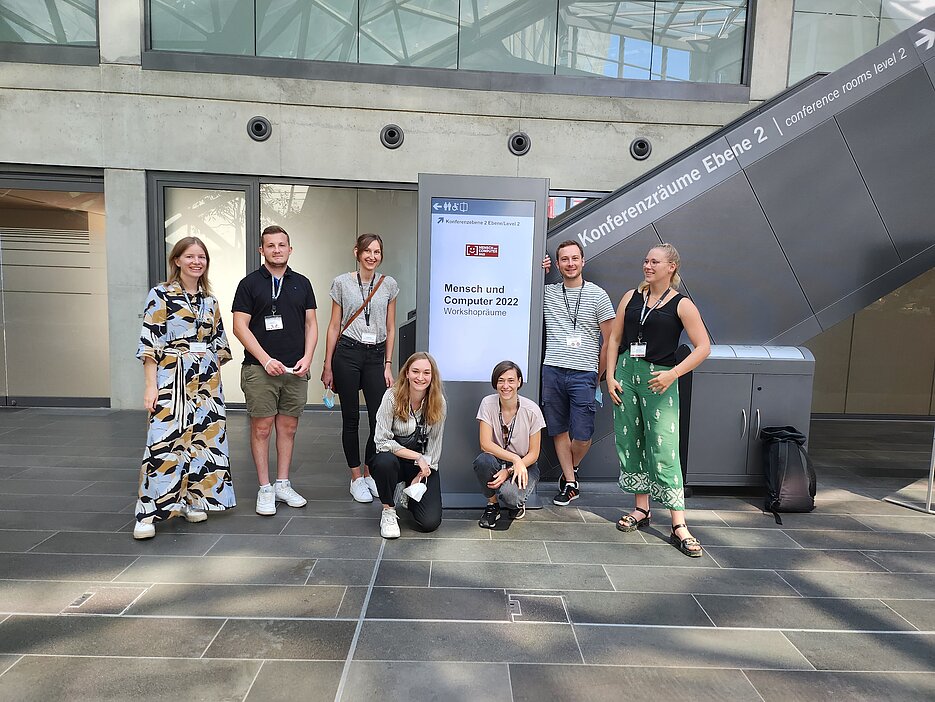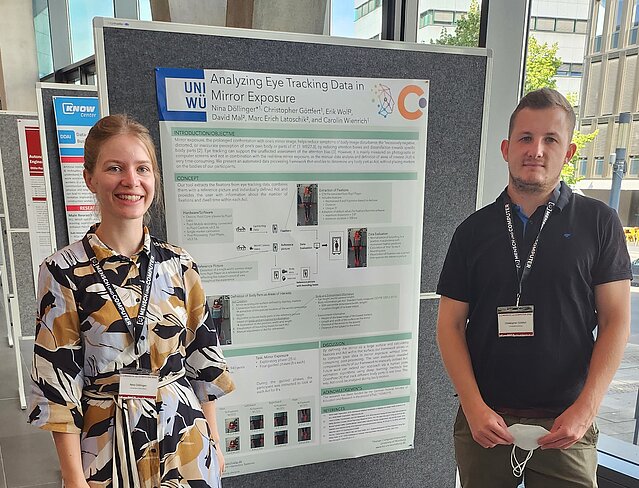MuC 2022
22.09.2022After two years of completely digital conferences, the largest conference series of human-computer interaction in Europe, "Mensch und Computer 2022", took place in presence for the first time again. The Psychology of Intelligent Interactive Systems Group was was represented in Darmstadt with contributions on various topics.
Christopher Göttfert und Nina Döllinger presented a prototype for processing and analyzing eye tracking data in mirror exposures for body image therapy. Based on standardized body measures, the analysis tool enables a semi-automated generation of areas of interest the mirror.
Marie Fiedler on a user evaluation of a virtual interaction suitcase for intercultural exchange in the classroom. Together with prospective teachers, it was investigated to what extent the interaction suitcase contributes to a sense of connection and a positive experience.
Rebecca Hein, Marc Erich Latoschik, and Carolin Wienrich. 2022. Usability and User Experience of Virtual Objects Supporting Learning and Communicating in Virtual Reality. In: Pfleging, B., Gerling, K. & Mayer, S. (Hrsg.), Mensch und Computer 2022 - Tagungsband. New York: ACM. (S. 614-616). DOI: 10.1145/3543758.3547568
Valentin Roß presented a prototype for creating augmented reality-based in-situ instructions. The prototype is designed to reduce the necessary time and expertise in the modeling of 3D representations by using basic geometric shapes that are placed closely around a real object.
Carolin Wienrich, Valentin Roß, and Joachim Baumeister. 2022. Creation of In-Situ Instructions Made Easy: Development and Evaluation of a Prototypical AR Tool. In: Pfleging, B., Gerling, K. & Mayer, S. (Hrsg.), Mensch und Computer 2022 - Tagungsband. New York: ACM. (S. 614-616). DOI: 10.1145/3543758.3547548

Besides, other members of the University of Würzburg were present at the conference. The Chair of Psychological Ergonomics presented the following:
Pauline Künzl presented a poster on the development of the UNeedS, a new UX measurement tool to capture the satisfactions and frustrations 13 fundamental psychological needs. The research took place as part of the CoTeach project [https://www.uni-wuerzburg.de/lehre/coteach/] and was awarded an Honorable Mention.
Sara Wolf, Franzisca Maas, Pauline Künzl, Anna Hohm, and Jörn Hurtienne. 2022. UNeedS: Development of Scales to Measure the Satisfaction and Frustration of 13 Fundamental Needs. In Mensch und Computer 2022 (MuC ’22), September 4–7, 2022, Darmstadt, Germany. ACM, New York, NY, USA, 6 pages. https://doi.org/10.1145/3543758.3547572
Carina Spangenberger und Nathalie Papenfuß reported on their experiences in conducting the Contextual Design process with additional elements of Participatory Design in collaboration with a microenterprise. They presented the side effects observed during this case study by means of a poster.
Nathalie Papenfuß, Carina Spangenberger, and Stephan Huber. 2022. Side Effects of Increasing Participation in a Contextual Design Process: A Knowledge Management Case Study. In: Pfleging, B., Gerling, K. & Mayer, S. (Hrsg.), Mensch und Computer 2022 - Tagungsband. New York: ACM. (S. 323-327). DOI: 10.1145/3543758.3547535
Rahel Schneider, Hauke Wendt und Alexander Kuon presented a prototype of the interaction concept AID-Watch they developed. The AID-Watch app runs on conventional smartwatches and is designed to help people with cognitive impairments keep track of the structure of their daily lives.
Rahel Schneider, Hauke Wendt, and Alexander Kuon. 2022. AID-Watch - Smartwatch for People with Cognitive Impairments. In: Pfleging, B., Gerling, K. & Mayer, S. (Hrsg.), Mensch und Computer 2022 - Tagungsband. New York: ACM. (S. 614-616). DOI: 10.1145/3543758.3547513




